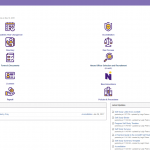 Continually evolving demands placed on LSU Residency Coordinators were the driving force behind the creation of the LSU School of Medicine’s new GME Coordinator Knowledge Base. In an effort to accommodate the evolving institutional and accreditation guidelines for GME program management and oversight, the GME staff redesigned and reorganized their website to produce one comprehensive resource that improves the process for collecting and distributing detailed information from the GME office to coordinators.
Continually evolving demands placed on LSU Residency Coordinators were the driving force behind the creation of the LSU School of Medicine’s new GME Coordinator Knowledge Base. In an effort to accommodate the evolving institutional and accreditation guidelines for GME program management and oversight, the GME staff redesigned and reorganized their website to produce one comprehensive resource that improves the process for collecting and distributing detailed information from the GME office to coordinators.
Problems with the existing GME website – Co-creators Chris Callac, Stephanie Galendez, Yolanda Lundsgaard, Leigh Peters, Ashley Walker and Brett Williams, with the help of a select focus group of Residency Coordinators, identified the following problems within the existing GME website:
- Multiple iterations of documents, forms, and systems, referred to using varying terminology, and in varying locations on the GME site
- Process changes and outcomes discussed in group meetings but not documented for absent coordinators
- Disorganization of site increased confusion for program coordinators
- Multiple iterations of forms and documents made it difficult to locate relevant and up-to-date required residency documentation
Goals for the Knowledge Base – Ultimately, the team’s goal for the new GME Coordinator Knowledge Base is for the site to be the single source of all information that a coordinator needs to do his or her job. Additionally, it is the receptacle for a large amount of Institutional knowledge, gained during their collective 100+ years of tenure at LSU School of Medicine. The GME Office has spent hours reviewing this content and compiling documents that are useful for residency coordinators. The culmination of the group’s work can be found at https://lsugme.atlassian.net.
The Knowledge Base is unlike the GME website – The following differences between the existing GME site and the Coordinator Knowledge Base, make it an entirely new type of resource.
- A knowledge base is a form of website which, behind the scenes, collects and organizes information, connecting it with links and keywords, allowing a single piece of information to be shown in multiple places (while only needing to be updated in one location by the GME office.)
- Content is tagged with keywords, allowing a page about a topic, such as Duty Hours, to also contain links to other pages in the system that relate to Duty Hours.
- Changes and updates can be tracked and viewed by anyone. If a policy or procedure is changed, the system can show a user exactly what the difference is between the two versions.
- Enhanced search ability: The previous GME website’s content was embedded within various forms and documents, which required downloading individual files for use by coordinators. The new Knowledge Base contains all relevant content in one system and does not require viewing/downloading separate files to procure information.
- Communication archive: Instead of emails from the GME Office relaying important information, we now distribute information from the Knowledge Base, in the form of Blog Posts. When entered, a Blog Post is emailed to program coordinators, and is also kept in the Knowledge Base system, for viewing by others in the future. Additionally, summaries of program coordinator meetings are entered as blogs, to further document changes to GME procedures.
Quick Facts from the GME Knowledge Base
40 – Clinical sites with specific site contacts, on-boarding forms, maps, and rotating programs.
57 – Number of forms and documents used by coordinators (including instructions, samples for reference, and who to contact with questions for each one.)
153 – Identified acronyms used only within the scope of LSU or GME. (Think, The CCC and PEC met in the CSRB, while the PD and PC met in the CEB, regarding LSBME issues with FCVS.)
186 – Identified and defined versions of terms. (Think, My mom was born in Hotel Dieu the same year Dr. Smith trained at Charity. After Hurricane Katrina, my sister went to ILH, my brother was treated at ILPH, and I went to MCLANO.) These differing versions of terms for the Charity Hospital system could be interchangeable, depending on the vernacular of the coordinator.
156 – Number of personnel contacts, ranging from Program Directors, Coordinators, Agency Contacts (i.e. LSBME), LSU Administrative Departments (i.e. payroll, human resources, etc.), and Facility Contacts at our participating clinical sites.
1,176 – Total number of pages in the GME Knowledge Base!
Next steps – while much of the work is complete, the GME Coordinator Knowledge Base will remain a work-in-progress. Each week, the GME Office discovers additional, relevant content that has not yet been added to the system. Continued focus group meetings and coordinator satisfaction surveys will ensure that this resource is continually improved and updated to enhance the largest compilation of LSU School of Medicine GME resources for Residency Coordinators, to-date. For more information, visit https://lsugme.atlassian.net or stop by the GME Office.